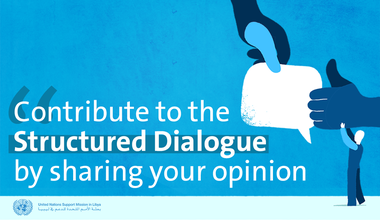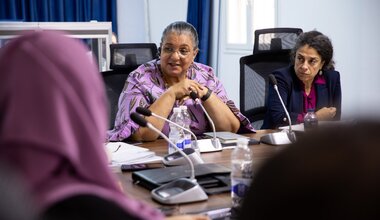UN report urges end to inhuman detention of migrants in Libya
GENEVA / TUNIS (13 December 2016) - The breakdown in the Libyan justice system has led to a state of impunity in which migrants are subjected to serious human rights violations and abuses, according to a joint UN human rights report published today.
“People smuggled or trafficked into Libya face torture, forced labour and sexual exploitation along the route, and many also while held in arbitrary detention,” said Martin Kobler, the Secretary General’s Special Representative for Libya and Head of the UN Support Mission in Libya (UNSMIL).
“The list of violations and abuses faced by migrants in Libya is as long as it is horrific. This is, quite simply, a human rights crisis affecting tens of thousands of people,” UN High Commissioner for Human Rights Zeid Ra’ad Al Hussein said.
The report, published jointly by UNSMIL and the UN Human Rights Office, is based on information gathered in Libya and from interviews with migrants who had arrived in Italy from Libya, among other sources*.
Migrants are held in detention centres mostly run by the Department for Combatting Illegal Migration (DCIM), where there is “no formal registration, no legal process, and no access to lawyers or judicial authorities,” the report states.
Places of detention are severely overcrowded, with insufficient food and clean water. With no access to toilets, detainees are often forced to defecate and urinate in their cells. Malnutrition, acute diarrhoea, respiratory problems and infectious diseases, including scabies and chickenpox, are common.
Smugglers and traffickers also hold migrants in “connection houses”, on farms and in warehouses and apartments, where they are forced to work to earn money for their onward transport.
“We are called animals and are treated as animals,” a 16-year-old boy from Eritrea told UNSMIL. “They beat us with what falls into their hands…it can be a rock, a stick, a brick,” a child migrant interviewed in Italy said.
The report also notes that DCIM and the Libyan Coast Guard** are subject to pressure from the armed groups that have proliferated since 2011. UNSMIL has received reports that some State employees and local officials have participated in the smuggling and trafficking process.
The report also details accounts of armed men, allegedly from the Libyan Coast Guard, intercepting migrant boats and abusing migrants. Migrants brought back to shore describe being beaten, robbed and taken to detention centres.
“Libya must acknowledge that migrants are being abused,” said Mr. Kobler. “But addressing migration is not only Libya’s responsibility. Countries of origin and destination beyond Libya also need to play their part.” He added: “I welcome the life-saving efforts currently being made by many in the Mediterranean.”
Among the report’s recommendations to Libya are: immediately release the most vulnerable migrants, with a view to urgently ending all arbitrary detentions; reduce the number of detention centres; ensure women are held separately from men; improve conditions of detention and protect detainees from torture and all other forms of abuse; and, in the medium-term, decriminalize irregular migration and adopt an asylum law.
The report also recommends that countries of destination beyond Libya continue search and rescue operations in the Mediterranean. Training and support for Libyan institutions that engage with migrants, including the Libyan Coast Guard, should be accompanied by comprehensive efforts to stop arbitrary detention of migrants and improve their treatment in detention.
“These are people who, for a range of reasons, feel compelled to leave their own countries and embark on these desperate and precarious journeys. The report lays bare the suffering endured by these migrants who have experienced unimaginable abuse and, in some cases, fallen victim to the despicable trade in human lives,” said High Commissioner Zeid. “The report serves to deepen our compassion and strengthen our resolve that the rights of migrants should be fully protected and respected, whatever their status.”
Full report available: REPORT ON HUMAN RIGHTS ABUSES AGAINST MIGRANTS IN LIBYA
In Geneva: Rupert Colville (+41 22 917 9767 /rcolville@ohchr.org), Liz Throssell (+41 22 917 9466 / ethrossell@ohchr.org) or Ravina Shamdasani (+41 22 917 9169 / rshamdasani@ohchr.org)
In Tunis: Jean El-Alam (+21697408051 / alamj@un.org)
BACKGROUND:
From 1 January to 22 November 2016, according to the International Office of Migration (IOM), 168,542 migrants arrived in Italy and 4,146 are known to have died at sea. The actual number is likely to be higher. IOM’s Displacement Tracking Matrix tracked 276,957 migrants in August 2016. This figure includes migrants as well as possible refugees and asylum seekers. At the time of writing, the UN Refugee Agency (UNHCR) had registered approximately 38,000 refugees and asylum-seekers in Libya, half of whom are from Syria. It is estimated that the total number of migrants, refugees, and asylum seekers currently in Libya is much higher than these figures.
The DCIM runs 24 detention centres but not all are functional. They hold between 4,000 to 7,000 detainees in total, with numbers varying significantly between centres. The Passport Investigation Department also holds migrants. In addition, armed groups hold migrants in unofficial detention centres.
*In 2016, UNSMIL conducted four visits to two DCIM detention centres in Tripoli and Misrata. UNSMIL and the UN Human Rights Office also undertook a monitoring mission to Italy between 27 June and 1 July, where more than 50 individuals were interviewed about their experiences in Libya. Since 2011 UNSMIL has monitored the situation of migrants in detention, including through frequent visits to DCIM detention centres until 2014 when its international staff were relocated to Tunis.
** The Libyan Coast Guard carries limited search and rescue operations in the Mediterranean.
For your news websites and social media: Multimedia content & key messages relating to our news releases are available on UN Human Rights social media channels, listed below. Please tag us using the proper handles:
 United Nations Peacekeeping
United Nations Peacekeeping UN
UN








